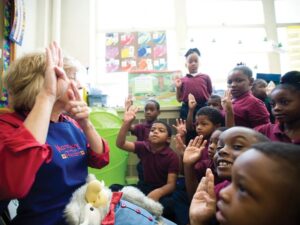When Jill Rigby Garner’s twin boys were in elementary school, she noticed parents were concerned about a lack of basic manners in the cafeteria. She began going to lunch, armed with red paper napkins and silly puppets with spaghetti-filled mouths, to teach the children basic table manners, how to write thank-you notes, and how to have respect for one another.
The school saw a noticeable difference in the children’s behavior, especially on field trips, where they would often receive compliments and praise from the people hosting them. Members of the community often called upon Garner to speak to Boy Scout troops, clubs, and students.
Then, Garner’s life turned upside down. Her husband left her and her sons, and she decided her interior design job was not right for her. She wanted to pursue something more suited to her life. “During this time, I was searching for what I was put on this earth to do,” Garner says. “One day, I was in Albertson’s grocery store, and I opened a magazine. It said, ‘Where have the manners gone?’ There it was, as big as can be. I knew this is what I was supposed to do.” She spent the next year and a half putting together a curriculum, which she printed and copied at Kinko’s, and then launched at an education conference in New Orleans.
Garner’s passion for instilling kindness, respect, and good manners in children has steadily grown into the nonprofit organization, Manners of the Heart, which produces a curriculum used in elementary schools across the country, works with high school students through the Leaders by Example program, and encourages families through books, parenting workshops, and community efforts.
Teachers can access the Manners of the Heart curriculum and teach it in the classroom. Some schools have guidance counselors teach core lessons while teachers provide reinforcement, but however schools decide to utilize it, it is a five-day-a-week program. Garner says she sees the greatest outcomes when it is given just as much importance as academics. The organization tries to liven the message and make more of an impact by sending their mascot, Wilbur, to schools and having cookie parties for the children.
“I love to see the light bulbs go off,” Garner says. “A second grade boy one time said, ‘I got it, Ms. Hill,’ and pointed to his heart. ‘What’s in my heart is going to come out of my mouth.’ That’s the whole thing. Our foundational principle is that it’s the content of the heart that determines the actions.”
The idea of esteeming others instead of yourself has made a positive impact on students, according to a research study conducted by Southeastern Louisiana University. In the 2013-14 school year, schools who used the Manners of the Heart curriculum saw a 30 percent decrease in disciplinary issues and raised their school’s letter grade from either an F to a D or a D to a C. A school in Oklahoma decreased their disciplinary referrals by 58 percent, an impressive improvement.
While Garner has sometimes worried that the organization would not make it, there would always be a breakthrough of corporate support and new funding to keep Manners of the Heart alive. She acknowledges that they are fortunate to have self-generated revenue by selling curriculum and training.
The community has shown interest in the program through the #BRRespect campaign. This media-driven campaign has become a social movement, pushed along by the cooperation of local media outlets. Lamar gave Manners of the Heart strategically placed billboards, radio stations donated air time, and CATS put the pledge of respect on downtown bus stops.
“Many people said the media wouldn’t buy into it, but the media in this city proved everybody wrong,” Garner says. Since the start of the campaign, Manners of the Heart has received about $560,000 in media promotions, and the campaign will continue into the next year on iHeartRadio.
Members of the Baton Rouge community can receive a daily email from the organization with an inspirational quote and a reminder of the good deed of the week. Manners of the Heart assigns a particular focus, or “big idea,” to each month, which is then broken down into a different emphasis for each week. One monthly theme was “Respecting Our Environment,” and a weekly task was to clean up the air by getting rid of the dirty words.
Ranging from simple tasks like putting your buggy back in the cart at the grocery store to the much deeper troubles of Baton Rouge, the weekly focus is striving to teach the city respect for one another in an effort to solve its problems. It is essentially an awareness campaign to make people pause and consider the effects of their words and actions before they say or do something.
“One day, we will see a world where the attitude behind the action reflects respect,” Garner says, with hope in her voice. “What has been lost in our society is respect, and we have got to find it again for the sake of the children.” ■





